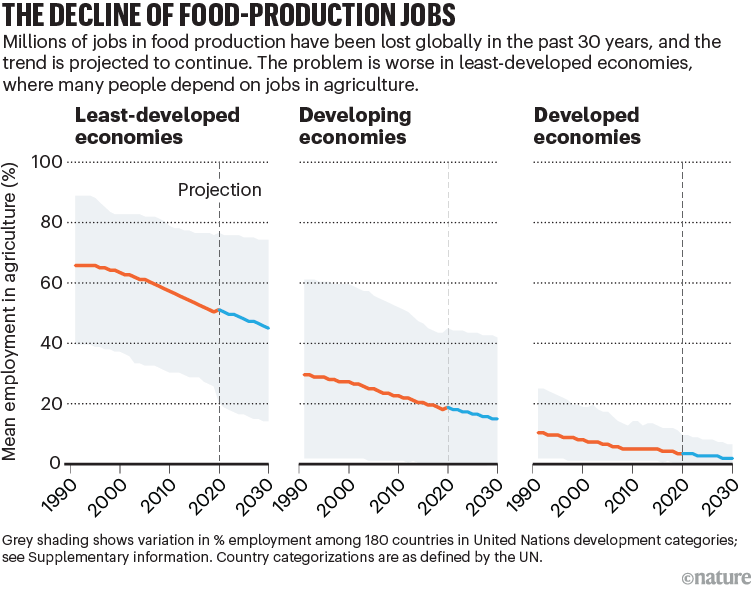Millions of jobs in food production are disappearing — a change in mindset would help to keep them
Millions of jobs in food production are disappearing — a change in ... Nature.com


Making Progress Towards Sustainable Development Goals
Making progress on internationally agreed goals for sustainable development, climate change, and biodiversity will require major changes to how the world’s food is produced and distributed 1. In 2021, the World Bank estimated that current food systems account for US$12 trillion in hidden social, economic, and environmental costs 2.
Emerging Global Initiatives
In recent decades, global initiatives have emerged to start making those changes. And opportunities are arising to address poverty, inequity, and other social problems alongside the climate and biodiversity crises, in part thanks to increased interest in making food production less environmentally destructive and more sustainable. Technological advances could also improve work conditions and boost production and market access for small- and mid-scale food producers.
The Decline of Food-Production Jobs
Yet making such initiatives work at scale means reversing a trend that many people see as an inevitable consequence of modernity and progress: the movement of millions of people from rural regions to cities or their edges.
- Employment data from the International Labour Organization, a United Nations agency, show that over the past 30 years, around 200 million jobs in food production have been lost globally.
- According to our analysis, the current pace could quicken, resulting in at least 120 million more jobs being lost by 2030 — mostly in low- and middle-income countries (LMICs; see Supplementary information).
This massive global decline in employment has contributed to the breakdown of families and communities throughout LMICs as millions of people move to urban areas 3, a process that is being intensified by climate change 4. Following migration in and between countries, many people who end up in urban or peri-urban settings are living more precariously than they were before — lacking employment as well as basic services such as housing 5. And intergenerational knowledge is disappearing: about the biodiversity used by farmers, fishers, pastoralists, forest and wild-species managers; of the technologies for producing food; and about how to manage the environment 6.
Source: ILO

Small but Mighty
Although most scholars, policymakers, and governments focus their attention almost entirely on operations that produce commodities for export, the contributions of Indigenous, smallholder, and family-based food-production systems are considerable. More than 866 million people support families and communities by working in agriculture, fisheries, pastoralism, forest management, and other small- to mid-scale food-production systems. That’s 26% of the workforce globally, and more than 80% of that in some countries, such as Burundi. Around 89% of these people live in rural areas and Indigenous territories, and nearly 500 million Indigenous people manage more than one-quarter of the global land surface.
Smallholder farms (those on less than 2 hectares) by themselves provide around 35% of the global food supply and a much larger share in Latin America, sub-Saharan Africa, and south and east Asia 9. Meanwhile, small-scale fisheries generate up to 110 million jobs, according to some estimates. This is more than the combined total of those in industrial fisheries, oil and gas production, shipping, and tourism 10.
Join us, as fellow seekers of change, on a transformative journey at https://sdgtalks.ai/welcome, where you can become a member and actively contribute to shaping a brighter future.








